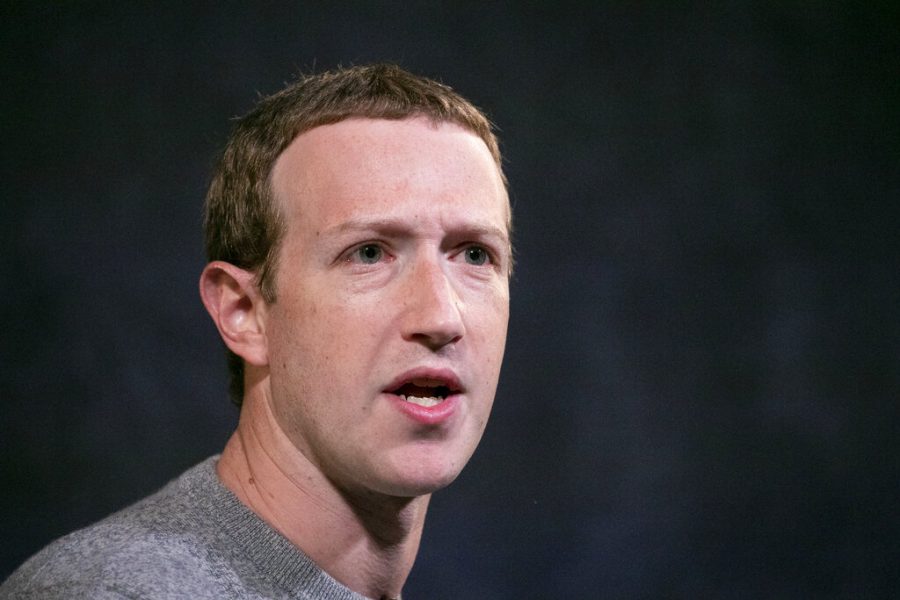Facebook employees protest decision to keep Trump posts
MARK LENNIHAN/Associated Press
Facebook employees are tweeting their frustration over CEO Mark Zuckerberg’s decision to leave up posts by President Donald Trump that suggested protesters in Minneapolis could be shot. On June 1, Facebook employees staged a virtual “walkout” to protest the company’s decision by logging into Facebook’s systems and requesting time off to support protests across the country.
June 1, 2020
OAKLAND, Calif. — Facebook employees are using Twitter to air their frustration over CEO Mark Zuckerberg’s decision to leave up President Donald Trump’s posts, which suggested protesters in Minneapolis could be shot.
While Twitter demoted and placed a warning on a tweet about the protests that read, in part, “when the looting starts the shooting starts,” Facebook has let it stand, with Zuckerberg laying out his reasoning in a post Friday.
“I know many people are upset that we’ve left the President’s posts up, but our position is that we should enable as much expression as possible unless it will cause imminent risk of specific harms or dangers spelled out in clear policies,” Zuckerberg wrote.
Trump’s comment evoked the civil-rights era by borrowing a phrase used in 1967 by Miami’s police chief to warn of an aggressive police response to unrest in black neighborhoods.
On Monday, Facebook employees staged a virtual “walkout” to protest the company’s hands-off approach to the Trump posts, according to a report in the New York Times, which cited anonymous senior employees at Facebook. The Times report says “dozens” of Facebook workers “took the day off by logging into Facebook’s systems and requesting time off to support protesters across the country.”
Something big is happening at FB – employees are speaking out publicly against CEO Mark Zuckerberg’s decision not to remove Donald Trump’s posts glorifying violence
In the many years I’ve covered FB, I’ve never seen this kind of public criticism beforehttps://t.co/5l3CokR75M
— Kurt Wagner (@KurtWagner8) June 1, 2020
“I work at Facebook and I am not proud of how we’re showing up. The majority of co-workers I’ve spoken to feel the same way. We are making our voice heard,” tweeted Jason Toff, a longtime director of product management at Facebook.
I work at Facebook and I am not proud of how we’re showing up. The majority of coworkers I’ve spoken to feel the same way. We are making our voice heard.
— Jason Toff (@jasontoff) June 1, 2020
Toff, who has a verified Twitter account, had 131,400 “likes” and thousands of retweets of his comment. He did not immediately respond to a message seeking comment on Monday.
“I don’t know what to do, but I know doing nothing is not acceptable. I’m a FB employee that completely disagrees with Mark’s decision to do nothing about Trump’s recent posts, which clearly incite violence. I’m not alone inside of FB. There isn’t a neutral position on racism,” Jason Stirman, design manager, tweeted.
Stirman did not immediately respond to a request for comment Monday.
Sara Zhang, product designer at the company, tweeted that Facebook’s “decision to not act on posts that incite violence ignores other options to keep our community safe. The policy pigeon holes us into addressing harmful user-facing content in two ways: keep content up or take it down.”
“I believe that this is a self-imposed constraint and implore leadership to revisit the solution,” she continued.
@Facebook‘s recent decision to not act on posts that incite violence ignores other options to keep our community safe. The policy pigeon holes us into addressing harmful user-facing content in two ways: keep content up or take it down.
— Sara Zhang (@superrrsara) June 1, 2020
Zhang declined to comment to The Associated Press.
Representatives for Facebook did not immediately respond to multiple requests for comment Monday.
Late Sunday, Zuckerberg again posted on Facebook, pledging a $10 million donation to racial justice groups. But he made no mention of Trump’s posts. Instead, he highlighted Facebook’s role in spreading the video of George Floyd’s death.
Floyd, a black man who was in handcuffs at the time, died after a white police officer ignored bystander shouts to get off him and Floyd’s cries that he couldn’t breathe. His death, captured on citizen video, sparked protests in Minneapolis that have spread to cities around America.
“We need to know George Floyd’s name. But it’s clear Facebook also has more work to do to keep people safe and ensure our systems don’t amplify bias,” Zuckerberg wrote.
Twitter has historically taken stronger stances than its larger rival, including a complete ban on political advertisements that the company announced last November.
In contrast, Facebook is targeted by regulators over its size and power and consequently has more to lose. Further complicating matters, the companies’ CEOs don’t always see eye to eye on their platform’s role in society.



